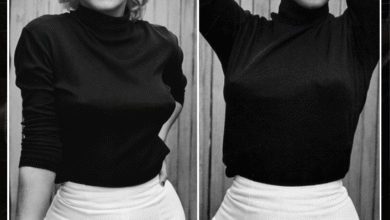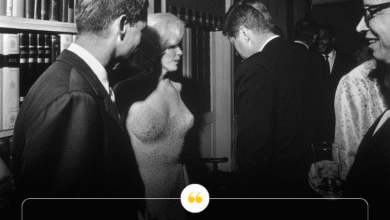Audrey Hepburn Talks About the Career-Altering Moment Gregory Peck Fought for Her Oscar-Winning Role!
OPINION: This article may contain commentary which reflects the author's opinion.
Roman Holiday, the classic 1953 romantic comedy directed by William Wyler, holds a special place in film history for its iconic performances and unique production. Starring Audrey Hepburn as Princess Ann and Gregory Peck as Joe Bradley, the film not only launched Hepburn’s Hollywood career but also showcased an unexpected yet deeply impactful collaboration between the two stars. Hepburn’s reflections on her experience working with Gregory Peck highlight the vital role he played in her rise to fame, especially during her first major Hollywood role.
The Beginning of Audrey Hepburn’s Hollywood Journey
Before Roman Holiday, Audrey Hepburn had only minor roles in films such as Secret People (1952). However, her role as Princess Ann in Roman Holiday would quickly establish her as one of the most beloved stars of the era. Originally, actresses like Elizabeth Taylor and Jean Simmons were considered for the role, but scheduling conflicts led to Hepburn being cast, a decision that would prove pivotal for her career.
At the time of filming, Gregory Peck was already an established star, with 18 films and four Oscar nominations under his belt. His status in Hollywood was undeniable, and the initial contract for Roman Holiday called for him to receive top billing, in line with his established star power. However, what followed behind the scenes would dramatically change the course of Hepburn’s career.
Gregory Peck’s Advocacy for Hepburn
While Peck was a Hollywood veteran, his actions during production showed a surprising and supportive side to his co-star. Despite his top-billing status, Peck advocated for Hepburn to receive equal billing, believing she deserved recognition for her talent. Hepburn, who was still relatively unknown at the time, later spoke about this pivotal moment in a 1988 documentary, His Own Man. She recalled, “Greg could very well have said at the time, ‘Well, you know, she’s just a little dancer and perhaps you’d better get somebody more established.’” But instead, Peck pushed for Hepburn to be featured above the title.
Peck’s determination to support Hepburn didn’t stop at the casting decision. Midway through filming, he took it a step further by calling his agent, George Chasin, and demanding that Hepburn be given above-the-title billing, predicting that she would win an Oscar for the role. “Oh yes I can. And if I don’t, I’m going to make a fool out of myself because this girl is going to win an Oscar in her very first performance,” Peck insisted. His prediction proved accurate when Hepburn won the Best Actress Oscar for her portrayal of Princess Ann, while Peck was not nominated.
This was a significant moment in Hollywood history, as Peck was willing to challenge industry norms to ensure his co-star was given her due recognition. The final billing placed both actors above the title, with Hepburn second to Peck. This gesture not only elevated Hepburn’s profile but also demonstrated the kind of camaraderie and support that is sometimes missing in competitive film industries.
On-Set Dynamics: A Perfect Pairing
The chemistry between Hepburn and Peck was a key factor in the film’s success. On set, their dynamic was balanced, with Peck’s pragmatic, grounded approach complementing Hepburn’s spirited and charming portrayal of the young princess. Critics praised the pair for their natural chemistry, with one reviewer noting that “Audrey Hepburn and Gregory Peck are ideal in the leading roles, and the story is very clever in getting a lot of mileage out of a simple idea.”
Despite Hepburn’s inexperience, particularly with emotional scenes, the film’s director William Wyler was instrumental in pushing her to deliver a powerful performance. During a particularly emotional scene, Hepburn struggled to cry. Wyler, in his usual intense fashion, pushed her to dig deeper emotionally, leading to real sobs on camera. While Wyler’s approach could be tough, Hepburn’s recollections indicate that Peck’s calm, supportive presence helped stabilize her during these intense moments, contributing to a positive and professional working environment.
The Lasting Impact of Roman Holiday
Roman Holiday became a monumental success, earning three Oscars, including Best Actress for Hepburn. The film’s charming premise, combined with the delightful performances of its leads, solidified its place in cinematic history. However, it was the unique collaboration between Hepburn and Peck that played a key role in the film’s enduring legacy. Peck’s advocacy for Hepburn set the stage for her blossoming career, while his support off-screen proved invaluable in her transition from newcomer to international star.
In addition to the Oscar win, Roman Holiday helped establish Hepburn as a global icon, and Peck’s generosity in sharing the spotlight became a symbol of the collaborative spirit in filmmaking. This gesture paved the way for her subsequent roles, with her next top billing coming in 1956 for War and Peace.
Comparisons and Legacy
When compared to other co-stars, Peck’s support for Hepburn stands out, especially considering the industry norms of the time. The film was a turning point for both stars: for Hepburn, it marked the beginning of a legendary career, and for Peck, it demonstrated his willingness to share the limelight in a way that few actors of his stature would.
While Cary Grant, another established star, was originally considered for Peck’s role, his decision to turn down the project changed the film’s dynamic. With Peck’s advocacy and his own contributions to the film, Roman Holiday became a collaborative success—one that marked a defining moment in both actors’ careers.
Conclusion: A Legacy of Support and Collaboration
The partnership between Audrey Hepburn and Gregory Peck in Roman Holiday remains one of Hollywood’s most iconic collaborations. Peck’s advocacy for Hepburn, both in terms of billing and recognition, helped propel her into stardom and laid the foundation for her long and successful career. Their on-screen chemistry, paired with the behind-the-scenes support Peck provided, created a working environment that allowed Hepburn to thrive and deliver one of her most memorable performances.
As Roman Holiday continues to be celebrated for its timeless charm, the legacy of this film also lives on in the example of collaboration, support, and mutual respect that Peck and Hepburn shared—a reminder of the power of uplifting one another in the world of entertainment.



